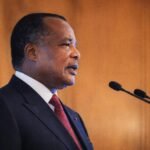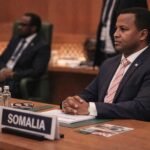Unicef Uganda, 08 May 2025 – UNICEF received US$ 1,080,000 towards Uganda’s Country Refugee Response Plan for 2024. This will enable UNICEF to provide an integrated lifesaving, child-centred response to reduce mortality and deprivation resulting from the refugee influx in Kiryandongo
The Government of Japan has committed approximately US$ 6.6 million to support refugees and host communities as well as border control for health, nutrition in Karamoja region, waste management, WPS (Women, Peace and Security) and DRR (Disaster Risk Reduction), over a period of one year from March 2025 to March 2026.
The support has been channelled through the United Nations and International Organizations: United Nations Children’s Fund (UNICEF), United Nations Human Settlements Programme (UN-Habitat), the United Nations World Food Programme (WFP), the United Nations High Commissioner for Refugees (UNHCR), International Organization for Migration (IOM), and Food and Agriculture Organization of the United Nations (FAO).
Ambassador Sasayama addressed a speech, “I am very honoured to announce Japan’s supplementary budget 2024-2025 contribution to the Government of Uganda with the total amount of 6.6 million USD in support of various areas, and one of the projects approved is supported by TICAD memorial package supplementary budget. We will be holding the Summit of 9th TICAD with attendance of all the African leaderships, which will contribute to promotion of further partnership between Japan and Uganda.” He also enthusiastically called for the president’s attendance at TICAD 9.
Right Honourable Robinah Nabbanja, Prime Minister of the Republic of Uganda, who attended the press conference said, “My office expresses profound appreciation to the Government of Japan for its exceptional commitment, demonstrated through a generous contribution of up to US$ 6.6 million this year to support the Karamoja region, refugee communities, and host populations. This critical support reaffirms Japan’s partnership in advancing Uganda’s development agenda, particularly in the areas of humanitarian relief, food security, and climate resilience. We commend the Japanese Ambassador for the exemplary leadership in fortifying bilateral partnership with Government of Uganda and the UN agencies supported by the Japanese Government in addressing global challenges in the area of migration, forced displacement, and climate change.”
Speaking on behalf of the UN system in Uganda, H.E. Leonard Zulu, the UN Resident Coordinator, said, “I am pleased to acknowledge this announcement of a contribution from the Government of Japan to Uganda, as part of long-standing partnerships for sustainable development. These fresh contributions announced today of US$ 6.6 million is timely and will support refugees and host communities, emergency health preparedness, nutrition in Karamoja region, waste management, Women Peace and Security and Disaster Risk Reduction.”
On the support to the August 2024 disaster at Kampala’s dumpsite, the UN Resident Coordinator added, “the solidarity of the government and people of Japan is exemplary, as this will not only minimize the further environmental degradation and loss of lives, but will also improve the city’s capacity to respond to similar disasters.”
Present at the press conference were representatives of the involved UN agencies: Ms. Margarita Tileva (UNICEF Uganda, Deputy Representative), Mr. Grace Lubaale (Head of Office, Somaliland and Lead, Waste Management, Sub-Regional East and Horn of Africa, Regional Office for Africa, UN-Habitat), Mr. Marcus Prior (WFP Uganda, Country Director), Mr. Matthew Crentsil (UNHCR Uganda, Representative), Mr. Sanusi Savage (IOM Uganda, Chief of Mission) and Mr. Antonio Querido (FAO Uganda, Country Representative).
UNICEF: has received US$ 1,080,000 towards Uganda’s Country Refugee Response Plan for 2024. This support will enable UNICEF to provide an integrated lifesaving, child-centred response to reduce mortality and deprivation resulting from the refugee influx in Kiryandongo District. The focus of the interventions is improving access to climate resilient, gender and disability inclusive WASH services. To reduce mortality and diseases caused by a surge in severe wasting, UNICEF will provide life-saving nutrition interventions to children under five years old. UNICEF’s response will directly benefit 75,783 refugees and host communities including 61,715 children. UNICEF’s response strategy leverages and strengthens existing government systems, engages and benefits local communities, promoting social cohesion, local ownership and sustainability.
UN-Habitat: has received U.S.$ 1 million to provide emergency technical support to Uganda’s Kampala Capital City Authority (KCCA) to rehabilitate the Kiteezi dumpsite. The support will specifically: a) stabilize the collapsed area of the dumpsite; b) rehabilitate approximately 4.3 hectares of the collapsed area of the 14.6 dumpsite; and c) provide technical support to KCCA to better manage dumpsites. This intervention includes the transfer and application of Japan technology – the Fukuoka method – for waste management. The project will contribute to Uganda’s commitments for SDG 6, clean water and sanitation, and SDG 13 climate action. The project is an excellent gesture of friendship with Uganda, and it contributes to reduced environmental degradation and pollution.
WFP: has received US$ 1million donation from Japan that will deliver essential and lifesaving nutritional support in Karamoja. This contribution will help combat acute food insecurity and malnutrition to 25,000 households comprising children under five, as well as pregnant and breastfeeding women.
Additionally, WFP Uganda will be receiving 2,000 metric tonnes of rice valued at US$ 2.2 million targeting 50,000 new arrivals with hot meals at reception centres at designated border points in Uganda. A growing number of new refugees are fleeing conflict from the DRC, Sudan, and South Sudan into Uganda.
UNHCR: has received US$ 1.5 million in support of Uganda’s Country Refugee Response Plan for 2025. This funding will enable UNHCR to provide protection and comprehensive assistance to more than 560,000 refugees and their host communities across Uganda. The contribution will play a crucial role in strengthening gender-based violence prevention and response, enhancing primary healthcare services through Village Health Teams (VHTs) and local health facilities, and promoting self-reliance among refugees through vocational training programs. This intervention will specifically benefit newly arrived refugees settling in northern and southwestern regions, ensuring they receive essential support. The funding represents a significant act of solidarity with Uganda, reinforcing the commitment to humanitarian assistance and refugee welfare.
IOM: has received US$ 900,000 to help Government of Uganda improve its capacity to handle public health threats such as Ebola, mpox, and Marburg Virus in vulnerable border districts. This funding will enhance health systems at border entry points, support surveillance, and improve early warning functions for communicable disease prevention and response. With JSB funding, IOM will support health system strengthening by (a) providing accessible data on mobility dynamics to inform public health actions, (b) training frontline health workers and border officials, (c) raising awareness in border communities, (d) providing community-based emergency health services, and (e) improving border health coordination.
FAO: has received US$1,130,000 to assist flood-affected communities in Uganda’s Rwenzori and Mount Elgon regions, with a focus on women vulnerable to climate-related risks. The project covers three key areas: (1) Climate Monitoring – installing 16 hydro-meteorological stations and training government staff in climate data analysis; (2) Early Warning Systems – establishing 2 early warning centres, training personnel, and developing gender-responsive messages to reach 88,000 households; and (3) Community-Based Flood Preparedness – identifying and implementing anticipatory actions and awareness campaigns for 5,000 households. The initiative supports Uganda’s SDG and national DRR commitments, while fostering synergies and innovation through partnerships with Japanese institutions such as JICA, JMA, and private firms, which is a strong gesture of long-lasting amity between Japan and Uganda.
Source : Unicef Uganda












